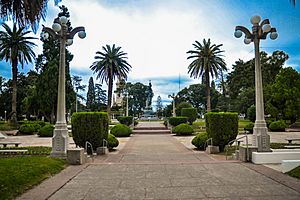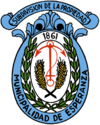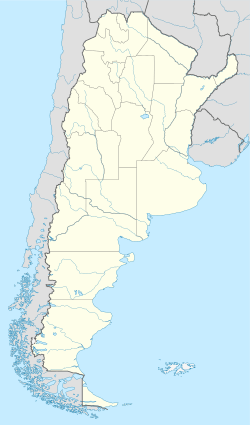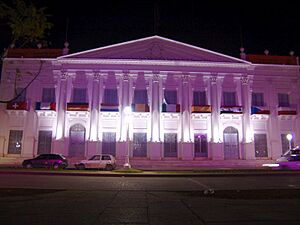Esperanza, Santa Fe facts for kids
Quick facts for kids
Esperanza
|
||
|---|---|---|
 |
||
|
||
| Country | Argentina | |
| Province | Santa Fe | |
| Department | Las Colonias | |
| Area | ||
| • Total | 289 km2 (112 sq mi) | |
| Elevation | 38 m (125 ft) | |
| Population
(2010 census)
|
||
| • Total | 40,125 | |
| • Density | 138.84/km2 (359.6/sq mi) | |
| Time zone | UTC-3 (ART) | |
| CPA base |
S3080
|
|
| Dialing code | +54 3496 | |
| Website | Official website: http://www.e-esperanza.gov.ar/ | |
Esperanza is a city located in the middle of the Santa Fe province in Argentina. In 2010, about 40,125 people lived there. It is the main city of the Las Colonias Department.
Esperanza is a very important place for milk production in Argentina. Many dairy farms raise a special type of cow called Holando-Argentino cows. Raising cattle is also a big activity here. The city also has many small and medium-sized factories. These factories make things like wood products, metal parts, food, books, clothes, and leather goods.
Contents
History of Esperanza City
Esperanza was the first planned farming community in Argentina. It was started by 200 families who came from different countries. These families were immigrants from Switzerland, Germany, France, Italy, Belgium, and Luxembourg. They arrived in January and February of 1856.
The city was officially started on September 8, 1856. The land for these families was set aside earlier, on June 15, 1853. This happened because of an agreement between the Santa Fe government and a businessman named Aarón Castellanos. The first name of the city was "Colony Hope," which is "Colonia Esperanza" in Spanish.
Esperanza's Early Government
Esperanza was the third city in the Santa Fe province to have its own city council. This happened on May 4, 1861. Only Rosario and Santa Fe cities had councils before Esperanza. In 1884, Esperanza became the main city of its department.
In 1892, Esperanza hosted the first big meeting about farming in Argentina. This meeting was called the Agricultural Congress of the Republic.
National Day of Agriculture
In 1944, the government decided that September 8 would be the National Day of the Agricultural Worker. This date was chosen because it is also the day of the Virgin Mary's birth, who is the patron saint of Esperanza.
Later, in 1979, Esperanza was named the permanent home for the National Festival of Agriculture. It also became the official place to celebrate National Agricultural Worker Day.
Notable People from Esperanza
Many interesting people have come from Esperanza. Here are a few:
- Fernando Paillet: A famous photographer.
- Gastón Gori: An essayist and writer.
- Eduardo Gudiño Kieffer: A writer and journalist.
- Álvaro Alsogaray: A well-known politician.
- José Pedroni: A poet and writer.
- Aldo Tessio: Another politician.
- Hector Borla: A visual artist.
- Sebastian Spreng: Also a visual artist.
- Matías Donnet: A professional football player.
See also
 In Spanish: Esperanza (Santa Fe) para niños
In Spanish: Esperanza (Santa Fe) para niños
 | Sharif Bey |
 | Hale Woodruff |
 | Richmond Barthé |
 | Purvis Young |




